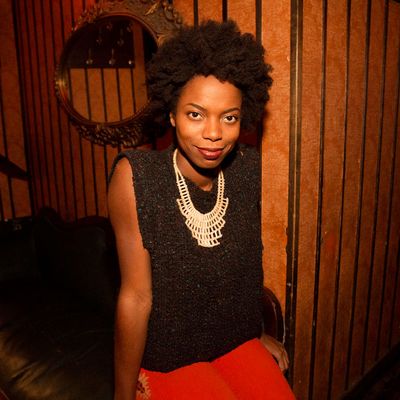
When she’s not appearing as Michelle Obama, Beyoncé, or Rihanna on Saturday Night Live, Sasheer Zamata spends her time doing stand-up in clubs around New York and on the road. Audiences might buy tickets expecting some sort of one-woman Rolodex of impersonations, Zamata’s skill most often utilized during her three-year tenure on SNL, but instead they’ll be greeted with the fiery personality that stops by Weekend Update for a few minutes, ready to school the audience on racial issues from the lack of emoji diversity to the N-word. As a comic, she’s been described on the podcast 2 Dope Queens as “feminist as fuck,” a description that seems appropo considering her gig as the ACLU’s celebrity ambassador for the Women’s Rights Project. In her first stand-up special Pizza Mind, which premiered on Seeso on March 30, Zamata takes on touchy subjects like privilege, gender, race, and hair (bodily, black and otherwise) with no fear of making it awkward, even if, she admits to Vulture, that hasn’t always been easy.
When you were working on this special did you feel that doing stand-up around New York is different from the kind of feedback from the audience on the road?
It’s different as in I feel like I’m preaching to the choir sometimes in New York, which I love, but that’s not necessarily a reflection of the viewpoints that are throughout the whole country. Sometimes I’ll go to other states and maybe get a different reaction to different jokes. I remember having a show in Birmingham, and I talk about race a lot in my set, and they were so open and down to hear about it. I was like, I have no idea how they’re going to react to this stuff. But they were like, “Oh yeah, we totally know that racism is real. We see it. It’s in our face, so we can’t ignore it.”
You have a joke where you address how audiences sometimes feel uncomfortable about that material. Were you always willing to talk about race onstage?
I’ve always been talking about race in some sort of capacity. But I haven’t been so biting in my material when I first started. Like in the past few years I’ve noticed that I’ve gotten to the point where I care less about the comfort of the audience [laughs]. Sometimes they’ll be uncomfortable, but then it’s my job to figure out how to keep them onboard. I don’t mind making them uncomfortable, but if they can leave still understanding what I’m saying then I’ve done my job. And if they leave feeling like, “Oh I was uncomfortable for a minute, but she’s still funny” then I definitely did my job. It’s not really my job if they’re uncomfortable — that’s something they need to figure out.
A lot of your material is about you feeling boxed in with your career: people mixing you up with different black actresses and the general lack of black parts out there, and comedically, people always expecting you to do your impressions from Saturday Night Live. Do find stand-up a way outside of that box?
Oh, definitely. I feel so lucky and so privileged that I like writing for myself. Like I don’t have to wait for somebody to create a part for me or a project for me. I can just do it. And that’s so great. Hopefully one day there will be so many parts for all types of people who look like me and don’t look like me. But as of now, it’s a little bit like you have to put your own foot in the door, because these doors aren’t always open. I think the boxing in that I feel is more because people don’t know me yet. I’m hoping that the more of my own material that gets out there, the more people will understand what I like doing, and who I am as a person, and understand that I don’t necessarily go in line with their own ideals of what a black woman in media does.
What kind of parts would you be liking to do?
I want to be in a Marvel movie. I want to be a superhero. I want to kick ass and be like an action star. I want that Marvel money, I want a Marvel franchise, and I want to work for the next 11 years knowing I got jobs coming up.
That sounds like a great dream.
I also want to write and produce comedies and dramas. I want to have an empire. I want to make my own stuff.
You start off the special by fighting with yourself. Do you find yourself conflicted a lot?
I feel like my biggest hurdle continuously through my career is fighting that tiny voice in my head, that’s saying, Who do you think you are? Why do you feel like people need to hear you speak or hear anything that you have to say? And I had to get over that and be like, No, what I have to say is valuable. It’s daunting to have to tell yourself, I’m the shit and fear me. So, yeah, I just wanted to put that out there, that I’m not just a bold superwoman like “YEAH! I’m ready for the world!” I also have a lot of fears and anxieties, that go along with this too.

